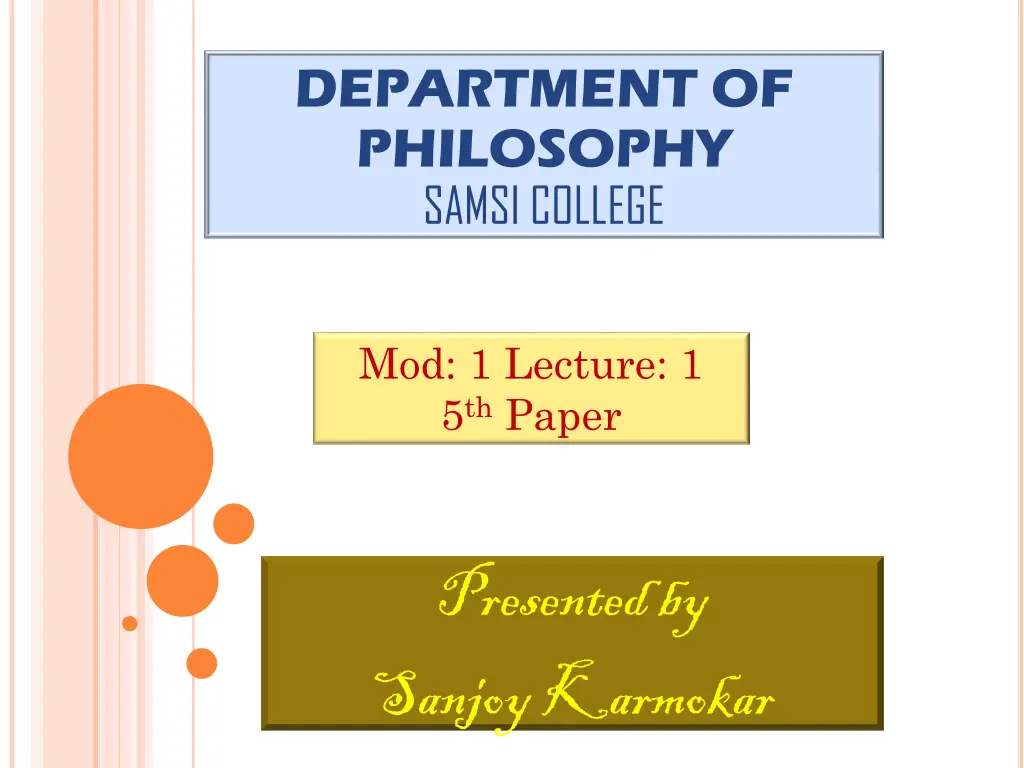
Explore the Philosophical Teachings of Naya-Vaiseshika Tradition
Dive into the intricate concepts of Naya-Vaiseshika philosophy, including the 16 padarthas of Naya Darsana and the 7 Padarthas of Vaiseshika according to Maharshi Gautama and Maharshi Kanada respectively. Discover the essence of Buddhi (Knowledge), Guna (Quality), and their definitions, along with insights into Smriti (Memory) and Anubhava. Unearth the profound wisdom embedded in these ancient philosophical doctrines.
Download Presentation

Please find below an Image/Link to download the presentation.
The content on the website is provided AS IS for your information and personal use only. It may not be sold, licensed, or shared on other websites without obtaining consent from the author. If you encounter any issues during the download, it is possible that the publisher has removed the file from their server.
You are allowed to download the files provided on this website for personal or commercial use, subject to the condition that they are used lawfully. All files are the property of their respective owners.
The content on the website is provided AS IS for your information and personal use only. It may not be sold, licensed, or shared on other websites without obtaining consent from the author.
E N D
Presentation Transcript
DEPARTMENT OF PHILOSOPHY SAMSI COLLEGE Mod: 1 Lecture: 1 5th Paper Presented by Sanjoy Karmokar
Naya Darsana According to Maharshi Gautama 16 padarthas Pramana, Prameya, samsaya, Prayojan, Dristanta, Siddhanta, Avayava, Tarka, Nirnaya, vada, Hettvabhasa, Chhal, Nigrahasthana. Jalpa, Vitanda, Jati and
According to Vaiseshika (Maharshi Kanada)- 7 Padarthas Dravya(Substance), Guna(Quality), Karma(Action), samanya(Universal), Visesha(Individuality), samavaya(Inherence) and Abhava(Negation). According to Naya-Vaiseshika Dravya(Substance) are 9 Ksiti(Earth), Apa(Water), Teja(Fire), Maruta(Air), Boma(Akasa),Dika(Space), Kala(Time), Atma(Soul) and Mana(Mind).
According to Naya-Vaiseshika Guna(Quality) are 24 Rupa(Colour), Sparsa(Touch), Parimana(Magnitude), samyoga(Conjunction), Paratva(Remoteness), Gurutva(Heaviness), Sneha(Viscosity), Buddhi(Knowledge), Dukha(Sadness), Prayatna, Dharma(Right Action), Adharma(Wrong Action) and Samskara(Memory). Rasa(Taste), Gandha(Smell), samkha(Number), Prithakatva(Deference), Vibhaga(Disjunction), Aparatva(Proximity), Dravatva(Fluidity), Savda(Sound), Sukha(Pleasure), Iccha(Will), Dvesha(Anger),
Buddhi or Knowledge Definition: Sarvavyavaharhetuh gunah buddhi jnanam Kaladou ativyapti varanaya guna iti Rupadou ativyapti varanaya sarvavyavahara iti Sarvavyavaharhetuh gunah this definition also is not valid for Nirvikalpaka jnana so final definition of Buddhi or knowledge is Jnanatvameva Laksanam
Buddhi or Knowledge Anubhava Smriti or Memory Prama or Aprama or Veridical anubhava Non-Veridical anubhava Tarka Samsaya Viparyaya Pratyaksa Or Perceptual Cognition savdavodha Anumana Or Inferential knowledge Upamana
Smriti or Memory Definition: Samskaramatrajanyam Jnanam Smriti Terms: Jnana , Samskarajanya , Matra Samskaradhvamse ativyapti varanaya Jnanam iti Ghatadipratyakse ativyapti varanaya Samskarajanyam iti Pratyabhijnayam ativyapti varanaya Matra iti
Anubhava Definition: Tadbhinnam jnanam Anubhava means Smritibhinnam jnanam anubhava Veridical Anubhava Definition: Tadvati Tatprakarakah Anubhavah Yatharthah. Yatha- Rajate idam rajatam iti jnanam. Non-Veridical Anubhava Definition: Tadbhavavati Tatprakarakah Anubhavah Ayatharthah. Yatha- Shuktou idam rajatam iti jnanam.
Pramana Definition: Pramakaranam Pramanam Pratyaksa or Perception Anumana or Inference Upamana Savda
Karana Or Instrumental Cause Definition: Asadharanam Karanam Karanam Sadharana Karana: Isvara , Jnana- Iccha-Prayatna of Isvara , Adrsta , Dika , Kala , Tat Tat Karyer Pragabhava Sadharanakarane Dik-Kaladou ativyapti varanaya asadharana iti According to pracinnyaya, Falayog-vyavacchinnam karanam karanam According to Navyanyaya, Vyaparavat asadharanam karanam karanam Definition of Vyapara: Tajjanyate sati tajjanya janakatvam Vyaparatvam Except the Eight sadharana karanas all karanas are a-sadharana karana
THANK YOU
